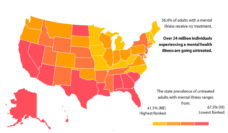Dogs are, of course, woman’s best friend. And like a good friend, dogs offer essential social support and companionship.
Whether that support extends to significant changes in human well-being or mental health remains relatively unknown. Some studies have linked human-dog relationships to decreased loneliness and improved self-esteem and physical activity. Still, others have found minimal effect.
Ethical and methodological and concerns limit all of this research. Dogs cannot be randomly assigned caretakers who are uninterested in adoption. Further, reverse causation cannot be ruled out; healthy participants may be more likely to adopt a dog. And, until recently, research into the benefits of dog ownership have centered on therapeutic options for people in nursing homes or living with severe mental illnesses.
In a new study, researchers moved the question to the general population. Participants were eligible if they did not currently have a dog. The 96 qualifying participants were split into one of three groups: dog adopters, interested adopters who were told not to get a dog during the study period, and uninterested in adoption.
Some studies have linked human-dog relationships to decreased loneliness and improved self-esteem and physical activity. Still, others have found minimal effect.
After six months, dog adopters rated their loneliness eight units lower on a 60-point scale than the other groups. This decline occurred within the first three months and was then sustained for the subsequent three months. Dog adopters saw no change to anxiety or depression estimates, aligning with previous research.
The researchers suggest a potential mechanism for the decrease in loneliness. Previous research has shown human-dog interactions (think therapy dog visits) lead to positive mood changes. These interactions also produce lower levels of cortisol, a stress-related hormone, and higher levels of oxytocin, our “bonding” hormone. When we adopt a dog, the interactions become regular; the researchers theorize this may translate to longer-term improvements.
If a dog does not become a best friend, at least she can be a loving companion and a buffer against isolation.














